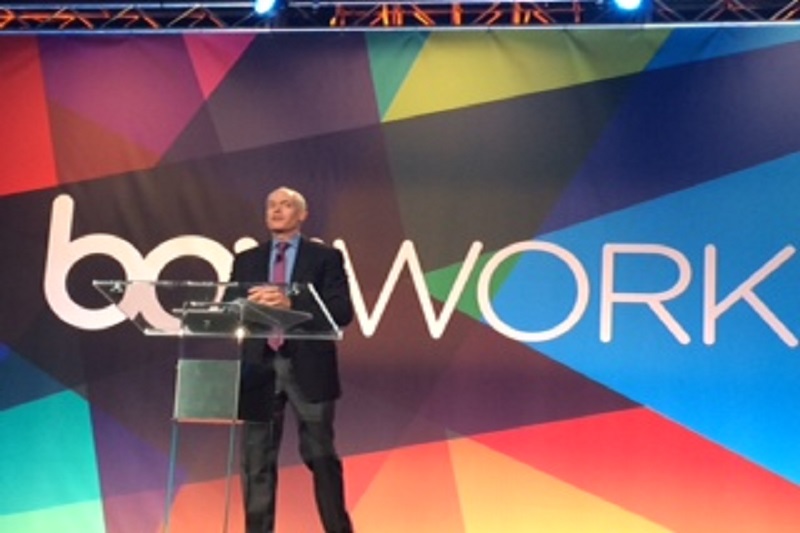Leaders need to be clock builders, not time tellers
Leadership author Jim Collins gives Boxworks delegates tips and tricks to ensure they can build the successful enterprise of the future


We're in the midst of an information revolution that will put increased pressure on IT decision makers to move up the ranks and become great leaders.
So claims leadership author Jim Collins, who used his keynote speech at Box's annual user conference Boxworks to discuss how those in the IT and C-level ranks can ensure they make the right impact as leaders to position their businesses for success now and in the future.
"Good is the enemy of great," he said, adding that all businesses and leaders are essentially created equal in that success is related largely to what happens in response to situations rather than the situations themselves.
"We believe it's very dangerous to study success. So we study the contrast between success and failure, endurance and collapse, great and good and those who thrive in chaos, disruption and uncertainty and those who do not," he added.
"The cause of their outcomes is not what happens to them. Greatness is primarily not a function of circumstances. It is a matter of conscious choices and disciplined leadership."
Collins said that the magic ingredient, the x-factor' of leadership was certainly not personality and even asked the audience whether they looked in the mirror this morning and saw a leadership force to be reckoned with.
"Many of the great executives have had a charisma bypass. It was surgically removed at birth," he said. "It's not about getting people to do things; it's about getting them to want to do the things that need to be done. If anyone ever tells you great leaders are born, they're not. Yes, there are some freaks of nature, but it's a decision not a birth right."
Get the ITPro daily newsletter
Sign up today and you will receive a free copy of our Future Focus 2025 report - the leading guidance on AI, cybersecurity and other IT challenges as per 700+ senior executives
Importantly, Collins said, it doesn't matter how good your technology, processes and products are, without good people to deliver on the vision, there's little point in trying.
"A great vision without the right people to make that vision [happen] is irrelevant," he advised, continuing that great leaders "are clock builders not just time tellers."
"If your company cannot be great without you, you have not yet built a great organisation. [Great leaders] want to build a great culture, based on values rather than being a genius with great helpers."
He spoke of so-called productive paranoia' which would help to build great leaders and enterprises now and in the future. "People ask me whether my glass is half full or empty," he said. "I say I have a full glass but I'm conscious it could shatter at any moment."
The cycle of good to great needs to be continued and repeated as it is only be doing this, rather than becoming complacent, that organisations and leaders will continue to succeed, according to Collins.
"The moment we think of ourselves as great, our slide toward mediocrity is started," he said.
Collins ended his life leadership lesson with a call to action to delegates to create a list of things not to do during their working day, as well as or instead of the traditional To Do list.
"How many of you, even if you had 50 hours in a day, still couldn't get everything done you need to do?" he added.
"True discipline is not in what we do, it's in what we have the clarity to not do. It is disciplined to have a stop doing' list."
Maggie has been a journalist since 1999, starting her career as an editorial assistant on then-weekly magazine Computing, before working her way up to senior reporter level. In 2006, just weeks before ITPro was launched, Maggie joined Dennis Publishing as a reporter. Having worked her way up to editor of ITPro, she was appointed group editor of CloudPro and ITPro in April 2012. She became the editorial director and took responsibility for ChannelPro, in 2016.
Her areas of particular interest, aside from cloud, include management and C-level issues, the business value of technology, green and environmental issues and careers to name but a few.
-
 Should AI PCs be part of your next hardware refresh?
Should AI PCs be part of your next hardware refresh?AI PCs are fast becoming a business staple and a surefire way to future-proof your business
By Bobby Hellard
-
 Westcon-Comstor and Vectra AI launch brace of new channel initiatives
Westcon-Comstor and Vectra AI launch brace of new channel initiativesNews Westcon-Comstor and Vectra AI have announced the launch of two new channel growth initiatives focused on the managed security service provider (MSSP) space and AWS Marketplace.
By Daniel Todd